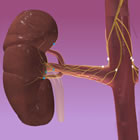|
Medtronic's U.S. Renal Denervation Trial Fails to Meet Efficacy Endpoint
Safety Endpoint is Met; All Symplicity Trials Suspended, Pending Review
|
 |

Renal sympathetic nerves and the kidney |
January 9, 2014 -- In a definite blow to the entire field of renal denervation, Medtronic reported this morning that its pivotal U.S. clinical trial for the Symplicity™ Renal Denervation System
has failed to meet its endpoint for efficacy.
Pending review by a panel of invited experts, the company has suspended enrollment in all of its renal denervation clinical studies worldwide.
The negative results were posted by Medtronic, prior to presentation at a scientific symposium or publication in a peer-reviewed journal. In a press release, Dr. Rick Kuntz, chief medical officer for Medtronic, stated: "We believe this course of action is the most prudent and will help us thoroughly evaluate these findings and determine the appropriate next steps for renal denervation therapy."
Positive Results and a Hoped-for "Fix" for Treatment-Resistant Hypertension
Renal denervation has been considered to be one of the most highly-anticipated advances for treatment-resistant hypertension: high systolic blood pressure > 160mm Hg that is not reduced, even when three anti-hypertensive drugs are used. The procedure involves threading a special catheter to the renal arteries and utilizing a controlled "burn" to disable the sympathetic nerves that control blood pressure.
A number of worldwide trials have shown positive results for this technology over the past two years. The European Society of Cardiology even authored a consensus statement on renal denervation in April 2013. Medtronic's Symplicity System is currently available in Europe, along with several other renal denervation devices manufactured by St. Jude Medical, Covidien, Vessix (purchased by Boston Scientific) and Recor. Although thousands of patients have been treated with these new devices in Europe, Asia, Africa, Australia and The Americas, no renal denervation system was available in the U.S. In fact Medtronic was the only company running a pivotal clinical trial, aimed at FDA approval. And the HTN-3 trial was the first to measure a renal denervation procedure against a sham control.
Interestingly enough, the Symplicity System was one of the first medical devices to be accepted into the concurrent review program set up by the FDA, wherein CMS would review reimbursement at the same time as the FDA reviewed safety and efficacy, so that, if approved by the FDA, the Symplicity device would also instantly be deemed reimburseable.
Instant Negative Reaction from the Medical Community
The Company's announcement of a negative trial prompted instant assessments across the medical field. The words "flop," "failure," and "colossal setback" were tweeted and retweeted. Physicians and journalists who had expressed concern and skepticism about renal denervation over the past several years immediately re-posted their "I-told-you-so" articles. Even though the topic of renal denervation landed in several top ten advances of the past and future years, the instant digital amplifiers of our current age proclaimed this technology an abject failure.
Does The Efficacy Endpoint Failure of One Trial Herald the End of Renal Denervation?
Angioplasty.Org has been covering this field since its inception. There has been much debate about the actual value of renal denervation. In fact, an article, published in the November 2013 issue of BMJ Heart, predicted that more rigorous clinical trials of renal denervation would show far less efficacy than had been seen. A humorous lecture by Dr. Darrel Francis, one of the lead authors of that report, can be viewed on YouTube. The main thesis is that how one measures blood pressure (office BP vs. ambulatory BP) has major implications for the results of effectiveness.
As to why the researchers and company decided to announce the results so quickly, Angioplasty.Org reached out to the principal investigator for the SYMPLICITY HTN-3 trial, Dr. Deepak Bhatt, for his comments. He responded:

Deepak L. Bhatt, MD, MPH, FACC, FAHA, FSCAI, FESC |
"We felt it was important that we share the topline results with the medical community and with patients as soon as we could.
"We are still analyzing the large amount of data from the trial and once we have a full understanding of the results and implications to the field, we will submit for peer review, presentation, and publication."
And Angioplasty.Org also contacted Dr. Kintur Sanghvi of the Deborah Heart & Lung Institute in New Jersey for his viewpoint, since he is the Physician/Founder of the website RDNworld:

Kintur Sanghvi MD FACC FSCAI |
"It is very disappointing to know that the Symplicity HTN-3 trial did not meet the efficacy end point. The unusual breaking of the news release ahead of the expected presentation of the trial data at a scientific meeting has created a widespread negative impression. Maybe we are getting ahead of ourselves in the negatives.
"Many of us were getting ahead of ourselves with the positive trial data from the previous trials. The news is very disappointing particularly because these patients studied in HTN-3 trial have no other option for treating severe resistant HTN. Some of these patients are expected to have very high cardiovascular mortality despite complete compliance to multiple medications and their physician's treatment. Sympathetic nerve modulation scientifically made sense and gave hope to these patients.
"Personally I believe that this is not the end of renal denervation. We will learn more with the scientific presentation of the data. RDNworld.org will continue the efforts of non-biased forwarding of the science of renal denervation and sympathetic modulation."
Most likely, as Dr. Sanghvi opines, this is not the end of the road for renal denervation, but it is a cautionary tale. Perhaps further investigation and analysis will reveal that a specific subset of patients will indeed benefit from this technology. Certainly, the extreme optimism of the early assessments has been tempered, as well as the financial aspects: Medtronic's stock was down 2.43% for the day. And these results will be informing the actions of the other device manufacturers in this field. (Ironically, St. Jude Medical recently terminated its U.S. renal denervation trial because of enrollment difficulties, tied to the perceived success of the Medtronic clinical program).
This morning's press release from Medtronic, Inc. follows:

Medtronic Announces U.S. Renal Denervation Pivotal Trial Fails to Meet Primary Efficacy Endpoint While Meeting Primary Safety Endpoint
January 9, 2014 -- Minneapolis -- Medtronic, Inc. (NYSE: MDT) today announced that its U.S. pivotal trial in renal denervation for treatment-resistant hypertension, SYMPLICITY HTN-3, failed to meet its primary efficacy endpoint. The trial met its primary safety endpoint, and the trial's Data Safety Monitoring Board (DSMB) concluded that there were no safety concerns in the study.
"SYMPLICITY HTN-3 met its primary safety endpoint related to the incidence of major adverse events one month following randomization and renal artery stenosis to six months," said Deepak L. Bhatt, M.D., M.P.H., executive director, Interventional Cardiovascular Programs, Brigham and Women's Hospital Heart and Vascular Center, professor of medicine, Harvard Medical School, and co-principal investigator of SYMPLICITY HTN-3. "Importantly, however, the trial did not meet its primary efficacy endpoint."
George Bakris, M.D., professor of medicine and director of the ASH Comprehensive Hypertension Center at the University of Chicago Medicine, past-president of the American Society of Hypertension, and co-principal investigator of SYMPLICITY HTN-3 stated, "While it's disappointing the trial did not meet its primary efficacy endpoint, this is the most rigorous renal denervation clinical trial conducted to date, and the first of its kind to include a sham-control group. We look forward to advancing these data into the peer-review process and will submit these findings for presentation and scientific discussion at an upcoming scientific congress."
In light of the product's demonstrated safety profile, including the SYMPLICITY HTN-3 findings, no specific action is currently indicated for patients who have had the renal denervation procedure with the Symplicity system. Patients should consult with their physician regarding any questions they may have about their treatment.
Based on these clinical trial findings, Medtronic intends to formulate a panel of independent advisors made up of physicians and researchers who will be asked to make recommendations about the future of the global hypertension clinical trial program, as well as provide advice on continued physician and patient access to the Symplicity technology in countries with regulatory approvals.
Pending this panel review, the company intends to:
- Suspend enrollment in the three countries where renal denervation hypertension trials are being conducted for regulatory approvals (SYMPLICITY HTN-4 in the U.S., HTN-Japan and HTN-India).
- Begin informing clinical trial sites and investigators, global regulatory bodies, and customers of these findings and decisions.
- Continue to ensure patient access to the Symplicity technology at the discretion of their physicians in markets where it is approved.
- Continue the Global SYMPLICITY post-market surveillance registry and renal denervation studies evaluating other non-hypertension indications.
"We are disappointed that the clinical trial failed to meet its primary efficacy endpoint," said Dr. Rick Kuntz, chief medical officer, Medtronic. "We believe this course of action is the most prudent and will help us thoroughly evaluate these findings and determine the appropriate next steps for renal denervation therapy. We would like to thank the patients and investigators for their participation in the trial and their important contribution to the field of hypertension research."
The company is evaluating the carrying value of the renal denervation assets and based on the above trial results, believes a one-time impairment charge in the future will be likely. The company today reiterated its previously communicated revenue outlook and diluted earnings per share guidance for fiscal year 2014.
About the SYMPLICITY HTN-3 Clinical Trial
SYMPLICITY HTN-3 is the first blinded, randomized, controlled trial designed to evaluate the safety and effectiveness of renal denervation with the investigational Symplicity renal denervation system in patients with treatment-resistant hypertension and systolic blood pressure higher than 160 mmHg in the United States. Follow-up for all patients randomized in the trial will continue as planned out to five years.
The study randomized 535 treatment-resistant hypertension patients in 87 U.S. medical centers. People receiving the investigational treatment were compared with a sham-control group that did not receive treatment, with all patients continuing to take their blood pressure medications. Patients enrolled in the SYMPLICITY HTN-3 trial were randomly assigned to a group, with two out of three assigned to the treatment group and one out of three assigned to the sham-control group. In addition, those in the control group had the option to receive the treatment after the six-month assessment of the primary endpoint. The primary endpoints of the study are the change in office blood pressure from baseline to six months and incidence of major adverse events.
Further details about the SYMPLICITY HTN-3 Clinical Trial can be found on www.clinicaltrials.gov (Identifier: NCT01418261). Also, the full study design is published in Clinical Cardiology in February 2012; (35: 528-35).
About the Symplicity™ Renal Denervation System
The Symplicity™ renal denervation system consists of a flexible catheter and proprietary generator. In an endovascular procedure, similar to an angioplasty, the physician inserts the small, flexible Symplicity catheter into the femoral artery in the upper thigh and threads it into both renal arteries in turn. Once the catheter tip is in place within the renal artery, the Symplicity generator is activated to deliver a controlled, low-power radio-frequency (RF) energy routine according to a proprietary algorithm aiming to deactivate the surrounding renal nerves. This, in turn, is intended to reduce hyper-activation of the sympathetic nervous system, which is an established contributor to chronic hypertension. The procedure does not involve a permanent implant.
About Medtronic
Medtronic, Inc. (www.medtronic.com), headquartered in Minneapolis, is the global leader in medical technology - alleviating pain, restoring health, and extending life for millions of people around the world.
Any forward-looking statements are subject to risks and uncertainties such as those described in Medtronic's periodic reports on file with the Securities and Exchange Commission. Actual results may differ materially from anticipated results. Earnings per share guidance excludes adjustments relating to the fair value of contingent consideration payments, charitable donations to the Medtronic Foundation, restructuring charges, certain litigation charges, and any unusual charges or gains that might occur during the fiscal year. The guidance provided only reflects information available to Medtronic at this time.
Reported by Burt Cohen, January 9, 2014 |



